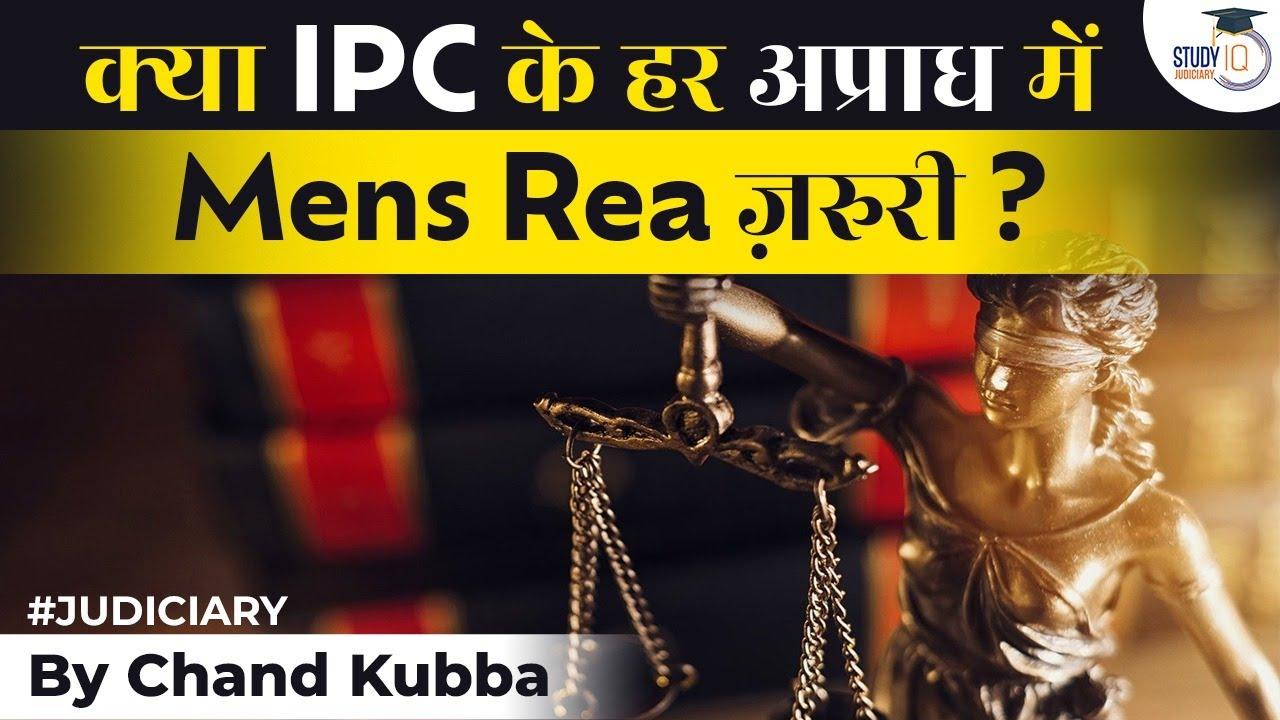Table of Contents
Can an Act be Punished Without Intention in IPC
Crime
- an Act or an Omission which is forbidden by law.
- “A crime is an act or an omission in respect of which legal punishment may be inflicted on the person who is in default either by acting or omitting to act”
Historically
- During the Dark Ages- Strict Liability Concept was Applied.
- Intention of the accused was not a consideration.
- A harms B, A will be punished irrespective of the fact whether A had intention to harm B or not.
- Then Comes The Age of Reason
- Ultimately came the concept of mens rea emerged in 17th century
Means Rea-
- generally refers to the guilty state of mind.
- ‘actus reus non facit reum nisi mens sit rea,’ which means ‘there can be no crime without a guilty mind.’
- Fowler v. Padget(1798)
- the Court held that Actus reus and mens rea both are essential for the commission of a crime.
- Lord Kenyon stated, “Actus non facit reum nisi mens sit rea is a tenet of natural justice and our law.” To be a crime, both the intent and the act must be present.
- From English Law it was Introduced by Lord Macaulay into IPC 1860.
Is Mens Rea required for every Crime in IPC?
- No.
- Offences in IPC can be broadly divided in to parts
- Offences
- Need Mens rea
- Mens rea not Required
Mens rea a pre-requisite-
- Definitions of many offences in the penal code demand that the crime is committed ‘voluntarily,’ ‘dishonestly,’ ‘knowingly,’ ‘fraudulently etc.
- E.g.
- Sction 378- Theft-
- Whoever, intending to take dishonestly any movable property out of the possession of any person without that person’s consent, moves that property in order to such taking, is said to commit theft.
- 295. Injuring or defiling place of worship, with intent to insult the religion of any class
- 295A. Deliberate and malicious acts, intended to outrage religious feelings of any class by insulting its religion or religious beliefs
- 299. Culpable homicide.—Whoever causes death by doing an act with the intention of causing death, or with the intention of causing such bodily injury as is likely to cause death, or with the knowledge that he is likely by such act to cause death, commits the offence of culpable homicide.

- Concurrence of Actus rea and mens rea is essential- held by courts in various cases
- Mohindar Singh vs The State (1959), it was held that the offence is determined by the existence of both mens rea and an actus reus.
- Both parts of the crime must be present
Exceptions To Mens rea
- Doctrine of Strict liability
- Many offences are dealt under strict liability doctrine, even if they are committed without the presence of a guilty mind.
- Purpose- This is done for the purpose of protecting the interest of the public

State of Maharashtra v. M.H George(1964)
- a landmark judgment.
- On November 27, 1962, MH George, a German, flew from Zurich to Manila with 34 kilos of gold concealed on his person.
- On the 28th, the plane arrived in Bombay, but the respondent did not disembark.
- The customs authorities searched the plane, they boarded the plane, searched the respondent, recovered the gold, and charged him with an offence under Sections 8(1) and 23(1-A) of the Foreign Exchange Regulation Act, 1947, as well as a Reserve Bank of India notification dated November 8, 1962, which was published in the Gazette of India on November 24.
- Supreme Court examined the purpose of the FERA of 1947 which was to combat smuggling and to check economic situation of the country.
- As a result, the Supreme Court adopted the strict liability concept rather than the maxim.
Prabhat Kumar Singh v. State of Bihar(2021)
- The Supreme Court held- that Mens Rea’s absence, i.e. malicious or evil intent, is not a relevant factor in matters of medical negligence.
Vicarious liability-
- Generally, a person is made liable for the acts committed by him but under vicarious liability, a person is made liable for an act committed by another person.
- This principle usually applies to the relationships shared by a master and servant or an employer and an employee.
- 154. Owner or occupier of land on which an unlawful assembly is held.
- 155. Liability of person for whose benefit riot is committed.
- under which a landowner is made vicariously liable for rioting committed in his land provided it is done for his benefit or if he does not report about the same to the police authorities.

























 WhatsApp
WhatsApp